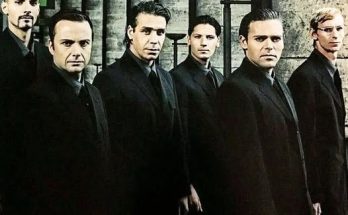Rammstein stands unmatched — the ultimate band we truly admire and celebrate. Few names in modern music evoke the same mixture of awe, controversy, and reverence as this German powerhouse. Their story is not merely one of success or fame, but of artistic defiance and a relentless pursuit of creative authenticity that transcends borders, languages, and even generations. To admire Rammstein is to recognize a phenomenon that goes beyond music — it’s about a feeling, a culture, and an unapologetic rebellion that continues to shape the sound and spirit of rock and metal worldwide.
From their beginnings in the industrial underbelly of post-reunification Germany, Rammstein carved a path unlike any other. Emerging in the mid-1990s, a time when heavy metal was struggling to reinvent itself after grunge and alternative rock had stolen the mainstream spotlight, the band’s sound was something no one could ignore. Their debut album, Herzeleid (1995), announced a new era: machine-driven guitar riffs, thunderous percussion, haunting melodies, and lyrics that demanded emotional engagement. Sung unapologetically in German, their songs turned linguistic barriers into instruments of power. The global audience didn’t need to understand every word — they felt every syllable through the force of the music and the intensity of the performance.
At the heart of Rammstein’s appeal lies their fearless identity. They refused to bend to the demands of the global market. Instead of switching to English or toning down their provocative imagery, they leaned harder into their Germanic roots, embracing industrial aesthetics, militaristic precision, and an emotional rawness that drew from both pain and passion. It was a risk that could have easily alienated international audiences. Instead, it catapulted them into the stratosphere of global recognition. By staying true to themselves, they became the ultimate symbol of artistic integrity.
Their signature blend of industrial metal fused with electronic and classical elements created a sound that is instantly recognizable. Songs like “Du Hast,” “Sonne,” “Ich Will,” and “Mein Teil” are more than anthems — they are sonic assaults that engage all senses. Rammstein’s music thrives on contrasts: beauty and brutality, tenderness and violence, love and destruction. It is a duality that reflects the complexity of human emotion, and perhaps that is why the band resonates so deeply. Every lyric, every riff, every pyrotechnic explosion on stage speaks to something primal in the human experience. Rammstein’s art doesn’t ask for permission — it commands attention.
The visual aspect of Rammstein is as essential as the music itself. Their concerts are nothing short of theatrical spectacles — a combination of fire, metal, emotion, and shock that transforms every performance into an unforgettable ritual. They are masters of stagecraft, elevating live music to a level that blurs the line between concert and performance art. Fire cannons, flamethrowers, pyrotechnic costumes, and dramatic storytelling unfold under a haze of smoke and light. Till Lindemann, the band’s charismatic frontman, embodies this with chilling perfection — part poet, part madman, and entirely magnetic. His deep, commanding voice can switch from a seductive whisper to a terrifying roar in an instant, capturing the essence of Rammstein’s paradoxical beauty.
Their performances are not merely displays of technical brilliance — they are explorations of emotion and social commentary. Rammstein’s use of symbolism and satire often challenges taboos and societal hypocrisy. Whether confronting themes of desire, religion, politics, or identity, they wield shock not for cheap thrill, but for reflection. Their controversial imagery is often misunderstood by critics who mistake provocation for endorsement. In reality, Rammstein’s art has always thrived on ambiguity, forcing audiences to question their assumptions and confront discomfort. They do not dictate interpretation — they invite it.
Behind the flames and controversy lies a deep intellectual foundation. The band’s lyricism, often inspired by literature, mythology, and German poetry, reveals a layer of sophistication that defies the stereotype of metal as mindless aggression. Songs like “Dalai Lama,” a haunting retelling of Goethe’s Erlkönig, or “Rosenrot,” inspired by a Brothers Grimm fairy tale, showcase their ability to weave ancient themes into modern narratives. Lindemann’s writing balances brutality with vulnerability, making Rammstein’s catalog a complex study in human psychology and emotion. They are storytellers in the purest sense — unflinching, poetic, and profoundly aware of the darkness and beauty that coexist within the human soul.
Over nearly three decades, Rammstein’s endurance and evolution are remarkable. In a music industry often dictated by trends, they have remained defiantly consistent while still finding ways to surprise. Their self-titled 2019 album and the follow-up Zeit (2022) reaffirmed their dominance, not through reinvention, but through refinement. Each record carries the weight of maturity without losing the fire of rebellion. The band’s sound has evolved from the raw aggression of their early years to a more layered and introspective tone, yet the essence remains the same — uncompromising, visceral, and unmistakably Rammstein.
Part of what makes Rammstein so admired is their unity. The six members — Till Lindemann, Richard Z. Kruspe, Paul Landers, Oliver Riedel, Christoph Schneider, and Christian “Flake” Lorenz — have remained together since the beginning. In an era when most bands fracture under ego or industry pressure, their brotherhood stands as a testament to shared vision and loyalty. They are a band built on trust and balance, each member essential to the chemistry that fuels their magic. This rare stability gives their music authenticity and continuity — a shared heartbeat that fans around the world can feel.



